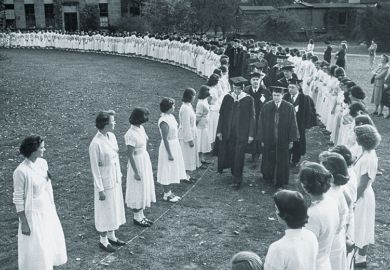Universities employ millions of people around the world and it is unrealistic to expect everything to go swimmingly all the time.
Perhaps in a time before the tyrannies of research assessment, student surveys and various other university rankings, a stern ignoring might have been in order. These days, it is much more likely that someone will be tasked with having what might euphemistically be called a “difficult conversation”.
Consider two hypothetical examples. In the first, you’re asked to speak to a colleague about what appears to be a valid student complaint. An otherwise exemplary student has failed something for the first time in their life. They claim that the assessment in question bore little resemblance to the syllabus taught during the course.
You investigate and discover that there is no course handbook, no material on the virtual learning environment and therefore no evidence that the topics in the exam paper were those covered in the lectures. Does this mean that your colleague is at fault?
Or in a second example, you are asked to address a lack of recognisable research outputs from a colleague employed to do research. If years have passed with nothing to show but a few internal seminars, does this suggest a lack of competence in a core duty?
Both examples represent conversational catastrophes in the making. How should you proceed? First, it would be worth considering alternative explanations. The lack of lecture slides, sample exam papers or marking guidance could represent poor practice or a conscious choice to task highly empowered, self-directed learners with delivering against an individual learning contract. None of us approves of too much spoon-feeding but if this is a conscious pedagogical choice you should find some evidence that student expectations had been framed appropriately.
Equally, there are several Nobel prizewinning researchers who appeared largely dormant in terms of interim publications before producing their magnum opus. Faced with the modern imperative to publish or perish, would some of our greatest scholars have missed the opportunity to redefine the very basis of their discipline? Judging whether such examples represent competence or incompetence is a delicate matter. How should one proceed?
Ask, how did we get here?
Amid the looming dread of a difficult conversation, it is worth remembering that the individual concerned was presumably hired by your university because they said the right things at an interview.
They love teaching. They told you that striving to improve the student experience is what got them out of bed in the morning. You’ll recall them decrying research assessment processes as divisive, demeaning and counterproductive. But they also said that they knew how to play the game anyway.
Try to understand the history behind the current circumstances. Read any documentation of prior conversations and keep an open mind. There are usually at least two sides to every story.
Set clear expectations
You may have to speak to several people to gather evidence. If so, set a clear timescale and agree the process that you plan to follow. It may be that the outcome will carry consequences for those involved. Make sure that everyone knows the answer to “when and in what circumstances?” from the outset. If people are entitled to representation in the process, make sure that it is offered and check what happens if your conclusions are contested through an appeal of some sort.
Check what the rules say
If your exploration of (in)competence rubs up against formal policies in the academic sphere or in terms of HR processes, be sure to speak to those responsible for these. You may find clear expectations already neatly set out in some formally approved document. If so, your task becomes easier in that you are simply seeking to establish whether someone has complied with those expectations.
Follow through and follow up
The alleged incompetence that you’re addressing may be a one-off misunderstanding or part of a longer saga. In either case there is likely to be some follow-up required to ensure that the issues have been resolved to everyone’s satisfaction.
While this is important, don’t underestimate the time required to do so. And don’t be entirely surprised to encounter that unhelpful combination of your now disgruntled colleague saying “yes” while proceeding to do “no”.
Keep on keeping on
Confronted with disappointing outcomes, it is important to consider how they could have been averted.
Unfortunately, the key protagonists tend to change every few years in universities. The dean will come to the end of their term of office, the HR partner may change role, or the research director might retire, meaning that the whole situation can feel like Groundhog Day. Understandably, therefore, resilience can be worn down.
Worse still, being the person who holds the difficult conversation rarely makes you popular. A former colleague once observed wryly, “Of course, I knew there were people in [the situation] who would wish me dead, and oddly, I never found that a great basis for conversation”. Find someone to offer you some support.
Robert MacIntosh is head of Heriot-Watt University’s School of Social Sciences, where he is professor of strategic management.
POSTSCRIPT:
Print headline: Make that difficult conversation easier
Register to continue
Why register?
- Registration is free and only takes a moment
- Once registered, you can read 3 articles a month
- Sign up for our newsletter
Subscribe
Or subscribe for unlimited access to:
- Unlimited access to news, views, insights & reviews
- Digital editions
- Digital access to THE’s university and college rankings analysis
Already registered or a current subscriber?








